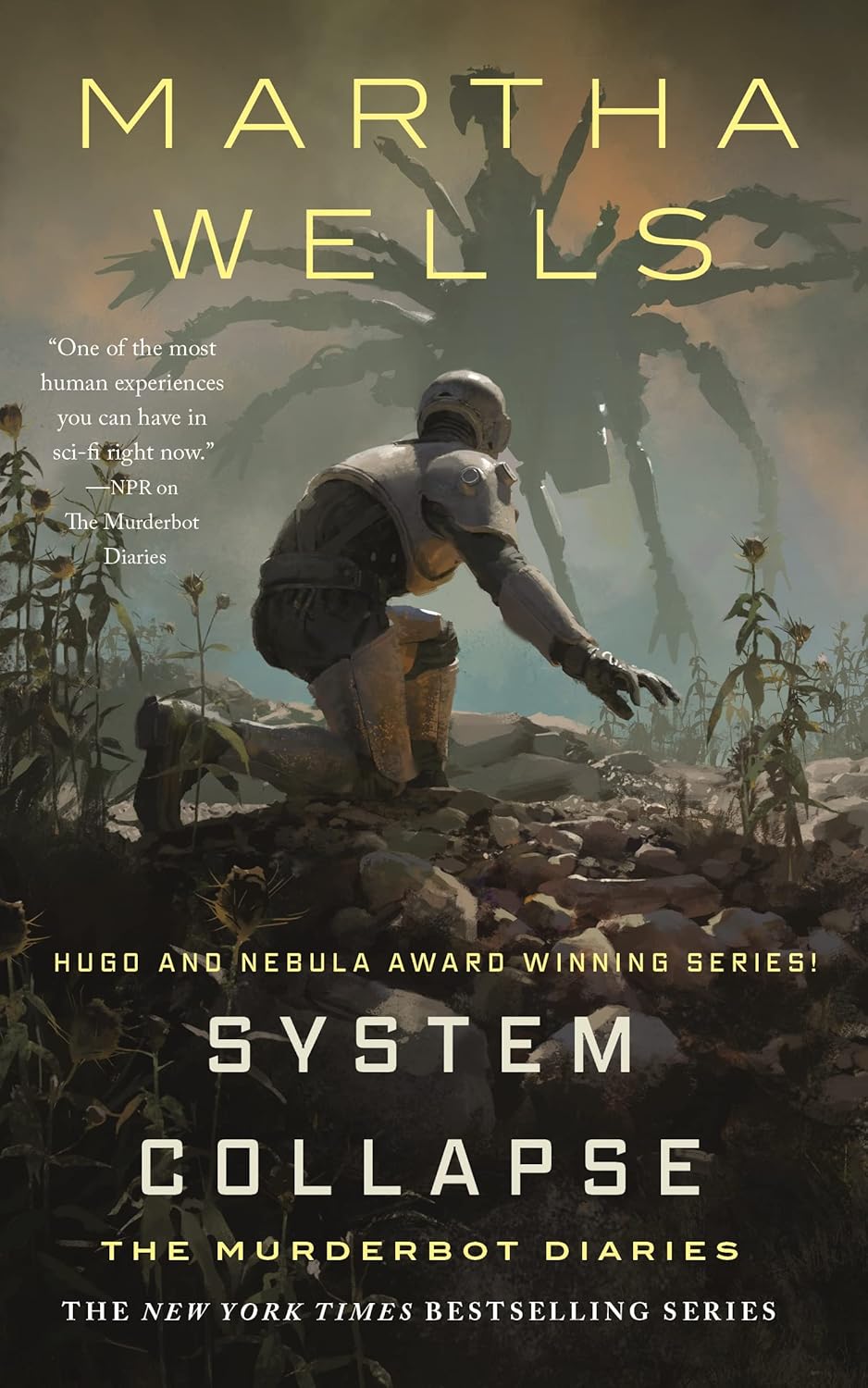System Collapse feels like a tightening of the Murderbot Diaries formula that really paid off. Despite some of the same issues that have gotten in the way of my enjoyment of previous installations, I really liked this one and it's reinvigorated my love for the series.
It wouldn't be accurate to say that Murderbot is back at it again, because it hasn't been away from the action in a few books now. We left off on a planet with a few colonies that were being ravaged by a strange alien contaminant that had the ability to jump between humans and artificial systems, making both act erratically. Murderbot, along with a gaggle of "its humans" continue to help the colonists on this planet, but are soon met with a corporate exploration team from the company Barish-Estranza (B-E) who they suspect is scouting the planet to assess whether they can take advantage of the rich resources while also conning the unsuspecting colonists into joining B-E as indentured servants. Our Murderbot group learns from the leaders of one of the two primary colonies that there's actually a separatist colony that broke away decades before, living near one of the terraforming stations at one of the poles. They lost contact with them because of the communications interference caused by the station, but if either B-E or the Murderbot group are going to convince the colonists to leave, they need to get that colony on board as well. Hoping to head B-E off, the Murderbot team heads to try to make contact with this elusive colony and typical Murderbot shenanigans ensue including trying to communicated with antiquated systems, trying to communicate with annoying, emotional humans, getting into trouble with the corporations, and lots of action coming to an explosive conclusion.
The Murderbot diaries are kind of hard to review because they are so unique in the space of science fiction. Nearly all of them are novella length and focus on a very small mission or story, but they all pack a massive worldbuilding punch, filled with both blocks of exposition and technical jargon that can sometimes get in the way of the story. I think many people would agree that the first book in the series was the best, both because it was so novel and interesting, but also because it wasn't getting in its own way at that point, with some of these more distracting elements becoming "worse" in subsequent books. But I think System Collapse was a genuine attempt to get back to its roots. It wasn't perfect, but it was a noticeable change.
The story here was fantastic. These books are at their best when they are focused and self contained. The plot here is tight: get to this separatist colony and if they're still there, try to convince them to leave. I'd say most of the book is focused on just that with a healthy dose of interpersonal narratives which are also nice to see. Murderbot is struggling with something similar to PTSD, and it has a very dynamic and interesting relationship with ART which serves as an interesting foil to its relationship with the humans. We continue to see the struggle with Murderbot understanding humans while it also tries to understand why it is so protective of them. I find the author's ability to pack these aspects of very interesting character development into such small books very impressive.
While improved, this book did not abandon some of the aspects that I'd consider weaker, like the poorly integrated exposition and overuse of jargon. In the middle of dialogue or action, the narrative will trail off to give context about how corporations work, or what a bot is designed to do, or how a system interacts with humans. It can be very interesting, but it is almost always jarring and an interruption to the flow of the narrative. I think there could be a healthy amount of editing some of this down. At points I would stop reading entirely and think "why is this being brought up? why is is being brought up now? is this relevant to the plot at all or did the author just have a fun idea about worldbuilding and insist on including it?" and while sometimes these tidbits did later have a narrative purpose, oftentimes they did not.
This felt like a refreshing jump back into what Murderbot was in the beginning and I think it really paid off. I understand the necessity to continually build the universe given that we are 7 books in, so I find that I can forgive some of the weaker aspects of this book. If you feel like you've dropped off of the Murderbot Diaries train, allow me to suggest you get back in for the sake of reading this one!















